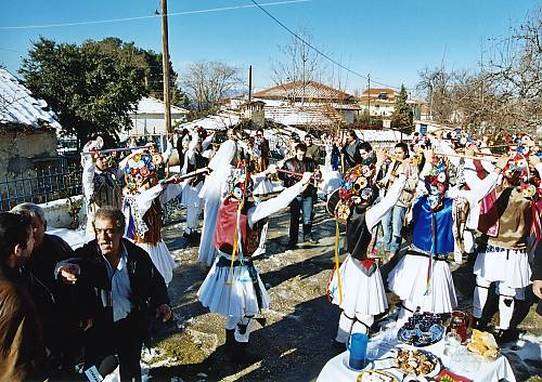Inscribed in 2016 on the Representative List of the Intangible Cultural Heritage of Humanity
From December 25 to January 5 in Kozani, west Macedonia, Greece, dancers, actors and musicians can be seen performing in village streets and visiting people’s homes to celebrate the coming of the new year.
The Momoeria dancers, a group made up of 30 male performers, are a special focus. They represent the priests of Momos (god of laughter and satire) or commanders of Alexander the Great wearing helmets, pleated skirts, traditional shoes and brandishing sticks dancing under their leader’s command to convince the powers of nature not to endanger the livelihood of villagers.
The Momoeria dancers, a group made up of 30 male performers, are a special focus. They represent the priests of Momos (god of laughter and satire) or commanders of Alexander the Great wearing helmets, pleated skirts, traditional shoes and brandishing sticks dancing under their leader’s command to convince the powers of nature not to endanger the livelihood of villagers.
Video credit: UNESCO
Actors surround the dancers performing a well-known satirical play featuring characters like an old man and the devil (this can vary among villages) who the audience is invited to tease creating a fun atmopshere. Instruments like the bagpipe play in the background.
The practice is mainly to wish the community prosperity in the year ahead, including healthy offspring and good harvests but now also encourages the sustainable management of natural resources.
Festivities culminate in the town square with everyone singing and dancing around a fire until morning. Transmitted informally from older to younger generations, it symbolizes part of the community’s cultural identity and helps to build social integration.
Source: UNESCO





 RSS Feed
RSS Feed